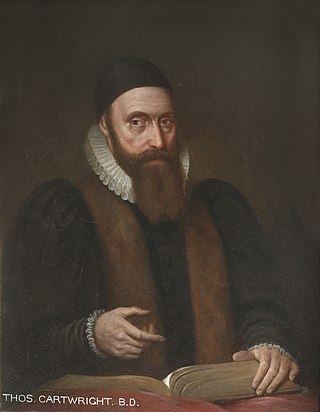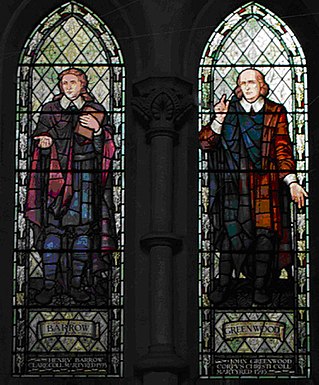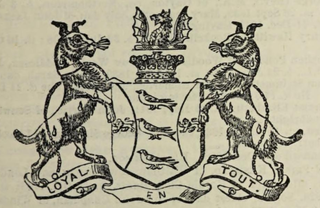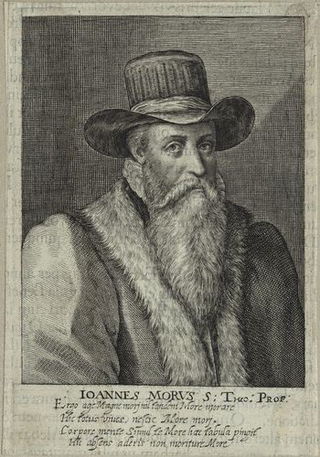Life
Harrison matriculated as a pensioner of St John's College, Cambridge on 4 October 1564, moved to Corpus Christi College, and graduated B.A. 1567, M.A. 1572. [1] [2]
In July 1573 Harrison applied for the post of master of the grammar school of Aylsham, Norfolk. He was recommended to Bishop John Parkhurst by the mayor and some of the aldermen of Norwich, with reasons excusing Harrison for having raised an objection to the use of the service of the Book of Common Prayer at his marriage. Parkhurst made difficulties, including that the liturgical offence had been in the face of warnings; but finally gave way after an appeal from inhabitants of Aylsham. Within a month of his appointment Harrison requested that changes might be made in the baptismal service on the occasion of his being godfather to an infant, and he was removed by the bishop in January 1574. [1]
Harrison returned to Cambridge with a view to taking orders in the Church of England orders. He was dissuaded by Robert Browne. Subsequently he became master of a hospital in Norwich (perhaps the hospital of St. Giles, or the Old Men's Hospital, which had some connection with Aylsham). Browne visited him at Norwich and lodged and boarded with him and his wife. In his autobiographical A True and Short Declaration, Browne placed Harrison first in the list of his helpers and disciples. According to Browne's narrative, Harrison came completely over to his views, and the two spent all their energies in preaching and collecting a congregation at Norwich. [1]
In April 1581 Bishop Edmund Freke of Norwich sent formal articles of complaint against Browne and Harrison to Lord Burghley, and the whole congregation decided to migrate to Middelburg in Zeeland in the autumn of that year. Harrison, according to his own account, suffered imprisonment before leaving England. At Middelburg the refugees enjoyed freedom of worship, and wrote tracts explaining their views, which were shipped over to England. Two men were hanged for distributing them, and a royal proclamation issued against them in June 1583. The cost of printing these "Brownist" tracts was apparently borne largely by Harrison. [1]
Conflicts arose among the members of the Middelburg congregation. Browne broke with Harrison and sailed for Scotland with a few followers in November or December 1583. Harrison as head of the congregation, made an unsuccessful effort to join it to the Conforming Church of English merchants presided over by Thomas Cartwright and Dudley Fenner. [1]
Harrison died about 1585. [1]
Works
Harrison wrote two of the prohibited books: [1]
- A Little Treatise uppon the firste verse of the 122nd Psalm. Stirring up unto carefull desiring and dutiful labouring for true Church Gouvernement, R. H., 1583, reprinted at Leyden, 1618. The preface states that the book is a fragment of a work on church government. A manuscript of such a work was published in 1952. Harrison's part in writing it remains unclear, however, since part is closely related to a work now attributed to Henry Barrowe. [3]
- Three formes of Catechismes, conteyning the most principal pointes of Religion, 1583.
Correspondence with Cartwright led to An Answere to Master Cartwright his Letter for joyning with the English Churches: whereunto the true copie of his sayde Letter is annexed, London. [1]
Harrison is also credited with: [1]
- Of Ghostes and Spirites walking by night, and of strange noyses, crackes, and sundry forewarninges, which commonly happen before the death of menne, great slaughters and alterations of kyngdomes. One Booke. Written by Lewes Lavaterus of Tigurine, and translated into Englyshe by R. H., London,1572 and 1596. Translation of a demonological work by Ludwig Lavater.
- A boke of the forme of common prayers, administration of the Sacramentes, &c., agreeable to Gods worde and the use of the Reformed Churches, 1586, 1587;
and possibly [1]
- Master R. H. His letter to the B. of Norwich, 1576 (in A Parte of a Register, pp. 365–70).
A Theologicall Discourse of the Lamb of God and His enemies, London, 1590, which has been attributed to Harrison, is by Richard Harvey. [1]

John Whitgift was the Archbishop of Canterbury from 1583 to his death. Noted for his hospitality, he was somewhat ostentatious in his habits, sometimes visiting Canterbury and other towns attended by a retinue of 800 horses. Whitgift's theological views were often controversial.

Thomas Cartwright was an English Puritan preacher and theologian.

Henry Barrow was an English Separatist Puritan, or Brownist, who was executed for his views. He led the London underground church from 1587 to 1593; spent most of that time in prison; and wrote numerous works of Brownist apologetics, most notably A Brief Discoverie of the False Church.

Joseph Hall was an English bishop, satirist and moralist. His contemporaries knew him as a devotional writer, and a high-profile controversialist of the early 1640s. In church politics, he tended in fact to a middle way.

John Greenwood was an English Separatist Puritan, or Brownist, minister and was executed for his faith. He led the London Underground Church from 1587 to 1593 and wrote several works of Brownist apologetics, working closely with Henry Barrow.

Dudley Fenner was an English puritan divine. He helped popularise Ramist logic in the English language. Fenner was also one of the first theologians to use the term "covenant of works" to describe God's relationship with Adam in the Book of Genesis.
The Brownists, also known as Saints among themselves and Separatists by outsiders, were a group of English Dissenters or early Separatists from the Church of England. They were named after Robert Browne, who was born at Tolethorpe Hall in Rutland, England, in the 1550s. The term "Brownist" was what outsiders used to describe them.
Robert Browne was the founder of the Brownists, a common designation for early Separatists from the Church of England before 1620. In later life he was reconciled to the established church and became an Anglican priest.

John Robinson (1576–1625) was the pastor of the "Pilgrim Fathers" before they left on the Mayflower. He became one of the early leaders of the English Separatists called Brownists, and is regarded as one of the founders of the Congregational Church.

Sir Valentine Browne, of Croft, Lincolnshire, was auditor, treasurer and victualler of Berwick-upon-Tweed. He acquired large estates in Ireland during the Plantation of Munster, in particular the seignory of Molahiffe. He lived at Ross Castle near Killarney, County Kerry. He was MP in three English and one Irish parliaments.

Sir Francis Knollys, KG of Rotherfield Greys, Oxfordshire was an English courtier in the service of Henry VIII, Edward VI and Elizabeth I, and was a Member of Parliament for a number of constituencies.
Henry Jacob (1563–1624) was an English clergyman and prominent figure of Calvinist views, who founded the first true Congregational Church in England. This church played a significant role in the development and spread of the Particular Baptist movement. Jacob's beliefs, associated with the Brownist movement, asserted the autonomy of the church, and advocated for the church to have its own ecclesiastical government without the interference of bishops. This stance challenged the traditional hierarchy of the Church of England and led to his imprisonment and exile.
Job Throckmorton (Throkmorton) (1545–1601) was a puritan English religious pamphleteer and Member of Parliament during the reign of Queen Elizabeth I. Possibly with John Penry and John Udall, he authored the Martin Marprelate anonymous anti-clerical satires; scholarly consensus now makes him the main author.
Francis Johnson was an English separatist, or Brownist, minister, pastor to an English exile congregation in the Netherlands.

John More was an English clergyman, known as the 'Apostle of Norwich.' Tending to nonconformity, he was treated leniently by the church authorities.

The reign of Elizabeth I of England, from 1558 to 1603, saw the start of the Puritan movement in England, its clash with the authorities of the Church of England, and its temporarily effective suppression as a political movement in the 1590s by judicial means. This led to the further alienation of Anglicans and Puritans from one another in the 17th century during the reign of King James (1603–1625) and the reign of King Charles I (1625–1649), that eventually brought about the English Civil War (1642–1651), the brief rule of the Puritan Lord Protector of England Oliver Cromwell (1653–1658), the English Commonwealth (1649–1660), and as a result the political, religious, and civil liberty that is celebrated today in all English speaking countries.
Thomas Fowle was a Church of England clergyman, Fellow of St John's College, Cambridge, rector of Redgrave and Hinderclay, Suffolk, and prebendary of Norwich Cathedral.
George Gardiner (1535?–1589) was an English churchman, Dean of Norwich from 1573.
Oliver Pigg was an English Puritan clergyman.
The London underground church was an illegal Puritan group in the time of Elizabeth I and James I. It began as a radical fringe of the Church of England, but split from the Church and later became part of the Brownist or puritan Separatist movement. William Bradford, Governor of Plymouth Plantation, cited the underground church as the first that ‘professed and practised the cause’ of the Pilgrim Fathers.
![]() This article incorporates text from a publication now in the public domain : Stephen, Leslie; Lee, Sidney, eds. (1891). "Harrison, Robert (d.1585?)". Dictionary of National Biography . Vol. 25. London: Smith, Elder & Co.
This article incorporates text from a publication now in the public domain : Stephen, Leslie; Lee, Sidney, eds. (1891). "Harrison, Robert (d.1585?)". Dictionary of National Biography . Vol. 25. London: Smith, Elder & Co.








